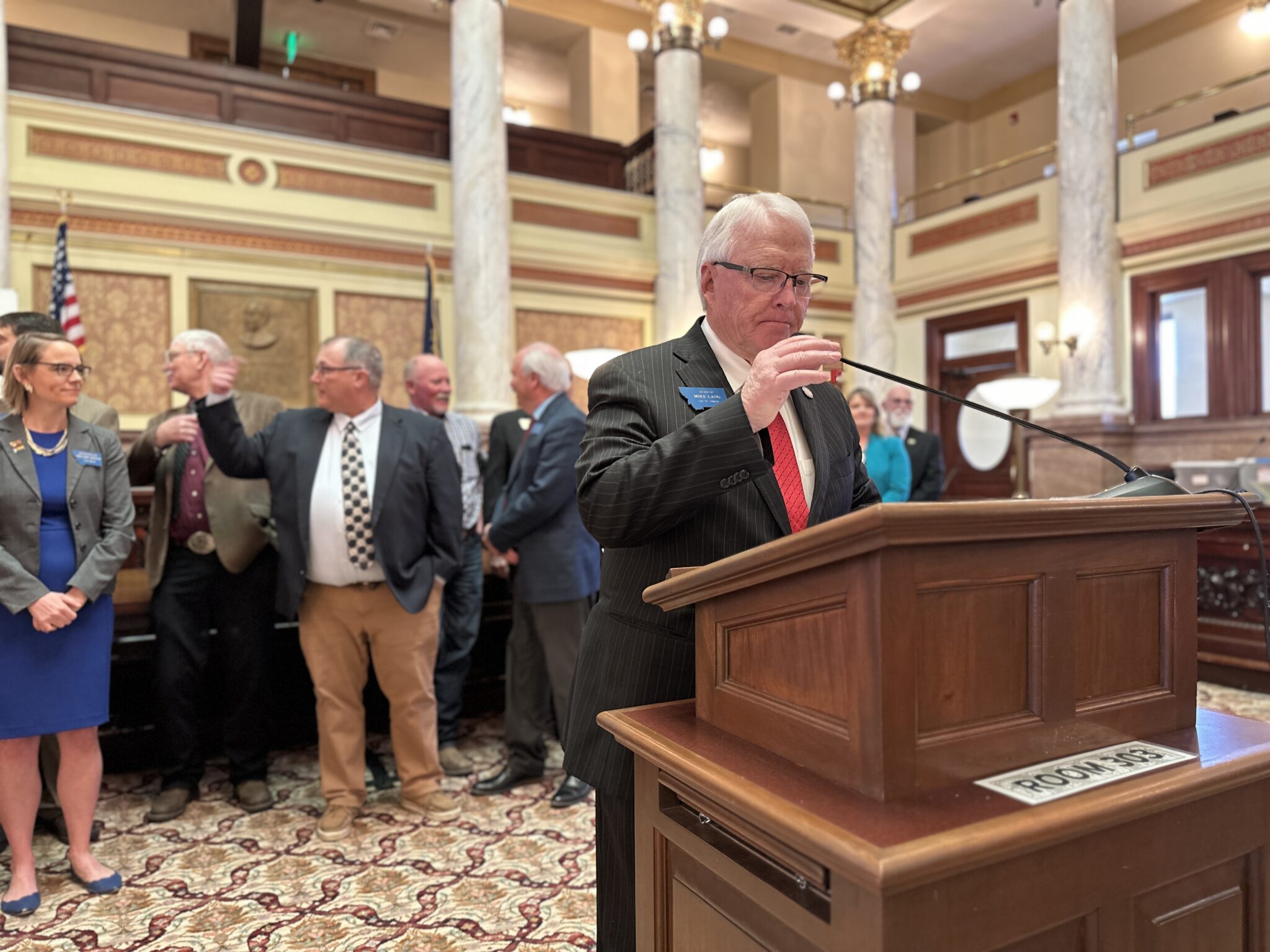Senate Bill 442 sent to Gianforte’s desk as House kills competing Senate Bill 538
By Blair Miller DAILY MONTANAN
The fight over Montana’s marijuana tax revenue may have reached a resolution Monday despite what a Democratic lawmaker called “shenanigans” on the House floor just hours after the Senate sent the bill with the broadest support to the governor’s desk.
But whether the part of the law that says how the $50+ million in annual revenue is portioned out changes remains to be seen, as Republican Gov. Greg Gianforte is unlikely to support the broadly praised Senate Bill 442, lawmakers have said in recent days and his office hinted Monday.
“The governor has substantial concerns with Senate Bill 442,” Kaitlin Price, a spokesperson for the governor, said in an email Monday afternoon.
The Senate voted 48-1 to pass SB442, sponsored by Sen. Mike Lang, R-Malta, on toward the governor’s desk – typically the legislature’s final step with respect to any bill, though it could have to vote to override a potential veto after the session is over.
SB442 puts 20% of the marijuana tax revenue toward county road construction and maintenance; 20% to a new Habitat Legacy fund; 12% toward state parks, trails, facilities and nongame accounts; 11% toward the HEART fund and 5% to veterans and surviving spouses. The general fund will receive around $13 million a year.
Should the bill not get to the governor’s desk until after the legislature votes to end the session this week, and should he veto it, lawmakers would be sent physical polls to vote on whether to override Gianforte’s veto. Anyone who does not return the poll would be considered a vote against the measure. Two-thirds of both chambers would have to agree to override a veto.
Lang, other lawmakers from both parties, and nearly 100 businesses and organizations from across the political and business spectrums support the Malta Republican’s bill, which several have said took months of work and compromise to reach its final form and gain the wide support.

Several of those groups and lawmakers from both parties gathered for a news conference at noon Monday to urge Gianforte, a Republican, to sign the bill an hour before the Senate sent it to his desk.
“We have overwhelming support, both in this room and both chambers of the Montana Legislature,” Lang told the dozens gathered in the old Supreme Court chambers of the Capitol. “The good thing about it is it spotlights many Montanans: ranchers, farmers, county commissioners, hunters, anglers, hikers, four-wheelers, veterans, home health care providers, energy people, and also many others who have been instrumental in pushing this across the floor.”
But last-minute changes to another bill made last week put in competing language surrounding what was in two other bills killed off by lawmakers over the past two months, which drew ire from members of both parties supporting Lang’s bill and opposed to continuing to find a way to reallocate the revenue toward the governor’s or other lawmakers’ priorities.
“This amendment erases that conversation from the bill,” said Rep. Mike Hopkins, R-Missoula, who sponsored the 2021 bill that created the current revenue streams and laid out the framework for the recreational industry.
Rep. Katie Sullivan, D-Missoula, said all of the last-minute changes left her feeling like there were “shenanigans afoot,” calling the measure and the late amendments “a vehicle for dishonesty.”
“I’m very concerned if this bill goes out, we’re going to see it back with some policy and revenue choices in it we don’t want to see,” she said. “Let’s say enough of the shenanigans; let’s get back to serious business.”
Monday’s actions were about three months in the making.
As House Republicans pushed to get more of the marijuana tax revenue put toward the general fund and the Department of Justice, some of them arguing that citizens had appropriated money via the I-190 ballot initiative in 2020 despite the legislature setting up the current framework in the 2021 session, Lang’s bill became a new vehicle for compromise between groups supporting the Habitat Montana program, other conservation and trails programs, county roads, the governor’s HEART fund and veterans services.
In late March, the Senate Finance and Claims Committee, on which Lang sits, amended his bill that was originally aimed at putting much of the revenue toward county road maintenance, to put it close to where it sits today. The bill passed out of the committee unanimously.
The Senate sent the bill over to the House in a 49-1 vote on April 4. Two weeks later, nearly 50 proponents of the bill showed up to the House Taxation Committee to voice their support, and Lang, who is term-limited, grew emotional as he closed on the bill, telling the committee it should pass it because of the array of backers and the hard work getting to that point.
The committee added on an amendment requested by the Department of Fish, Wildlife and Parks and cleared the bill out of committee in a 17-6 vote. It then saw 84 House members vote in support of the bill on second reading in the House.
SB442 then went to the House Appropriations Committee, where several members who have backed the theory that the citizens illegally appropriated the money by initiative sit – including Rep. Bill Mercer, R-Billings, whose House Bill 669 was a major competitor to Lang’s bill, as it aimed to put all the money in the general fund starting in 2025.
Though the committee chair and another member, Rep. John Fitzpatrick, R-Anaconda, had drafted amendments to the bill, when it came up for executive action, Fitzpatrick said in his 40 years at the Capitol, he didn’t think he’d seen a measure draw so much input from the public.
“Constituents back home say they like the bill exactly as is,” he said. “That’s kinda where I’m at.”
Rep. David Bedey, R-Hamilton, who was among the group backing Mercer’s bill, said he had the same perception as Fitzpatrick, telling the committee, “I think we should move this bill exactly as it is.”
The bill passed House Appropriations in a 17-6 vote, then passed third reading in the House 82-17 on April 26 – seemingly clearing its path to the governor’s desk because of the friendly House amendment and wide support in the Senate.
But there remained tension as to what was going to happen with the marijuana revenue, according to multiple lawmakers and lobbyists who have worked on the bill. Senate Finance and Claims sat on Mercer’s bill for executive action for eight days until it finally moved to kill the bill unanimously on April 26.
And even that was not the end of the marijuana revenue saga. After Mercer’s bill was tabled, similar language was added back into another bill with a broad title: Senate Bill 538, “Generally revise marijuana laws,” from Sen. Chris Friedel, R-Billings.
The original version of the bill had nothing to do with dispersing the marijuana tax revenue. But the day Mercer’s bill was tabled by Finance and Claims, House Appropriations amended SB538 to include language that was a mix of Mercer’s bill and another bill from Rep. Marta Bertoglio, R-Clancy, which sought to strip money from Habitat Montana and put it toward law enforcement and the general fund. Hundreds rallied at the Capitol to protect the portion of marijuana revenue funding Habitat Montana in late February.
When SB538 reached the Senate floor, its carrier, Rep. Bob Carter, D-Missoula, told lawmakers he didn’t recognize the bill anymore.
“It’s not the bill that came out of Business and Labor. I can’t support it and recommend you don’t either,” he told the body.
The bill narrowly failed on its second reading in a 49-50 vote. But shortly afterward, Hopkins asked the body to reconsider the bill, saying it was part of a larger conversation about marijuana policy and revenue that is still ongoing. The House voted 50-47 to reconsider the bill.
Last Friday, during a Senate Republicans caucus meeting, Lang asked President Jason Ellsworth, R-Hamilton and Majority Leader Steve Fitzpatrick, R-Great Falls, about SB442’s status along with SB538, saying he was concerned about his bill.
“You know the position of the Governor’s Office. It’s clear they’re going to veto that bill; they’ve said that multiple times,” Fitzpatrick responded.
He and Ellsworth said there were three key bills – House Bills 128 and 903, and SB538, which each make marijuana statute changes to shore up HB701 – that needed to pass in order to keep the current system from collapsing and marijuana businesses popping up all over the state.
Ellsworth said he thought “we are going to end up in conference committee” as SB538 came back to the Senate along with SB442.
The Senate voted Saturday to pass the amended version of SB442 in a 48-2 vote, setting up the third-reading vote on Monday.
But with Friedel also unhappy about the changes to his bill, and Hopkins mostly reserved to changing the policy instead of the revenue allocation, the House on Monday considered an amendment brought to the floor to strip out all the changes made by Appropriations to HB538 to put it back to the form in which it left the Senate – taking out all of the revenue allocations.
Rep. Tanner Smith, R-Lakeside, who is ardently opposed to the expansion of legalized marijuana in Montana, agreed, saying there was no one who understood what was going on behind the scenes and that there was “stinky stuff” passing through in the final days of the legislative session, which must end on Friday at the latest.
Initially, the amendment appeared poised to fail, as it briefly reached a 48-50 vote before what several lawmakers described as a “computer glitch.” The second time, the body voted 55-45 to adopt the amendment to strip out the language about the revenue streams.
After a brief closing from Hopkins, who said he was not trying to hide anything about what was happening between the bills, the House voted overwhelmingly, 38-62, to table SB538 again, where it and the competing revenue language is likely to stay, lawmakers and lobbyists said. It received votes from just over half of the House Republican caucus.
Another of Hopkins’ bills with a broad marijuana title, House Bill 229, was voted out of a free conference committee earlier Monday without changes to add in the revenue language, as some at the Capitol thought might happen. And unless lawmakers find another bill to fit the competing language into this week, as most want to sine die and head home, it appears any changes to how the estimated $110 million in revenue over the next biennium is dispersed could rest with the governor’s pen.
“Thank you for the kind words about 442 and about Montana,” Lang told the gathering of citizens, lobbyists and lawmakers at Monday’s press conference about the bill, singing its praises about the wide array of areas of the state it would touch.
“This bill deserves to be signed by our governor,” he said.

















